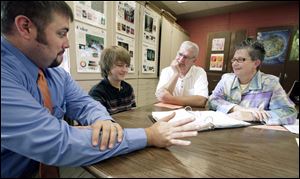
Maumee's Gateway Middle School adds students to parent-teacher mix
11/12/2008
Math teacher Garrett Barga, left, meets to discuss the progress of seventh grader Jimmy Spychala, 12, with parents Jim and Donna Spychala during the parent-teacher conferences at Gateway Middle School in Maumee. Students, usually left out of conferences, are able to participate at Gateway.
At Maumee's Gateway Middle School, there's something just a tad different about parent-teacher conferences.
They also include students.
For two days last week, 448 families participated in the conferences that in the Maumee schools are unique to Gateway. This was a participation rate of 71 percent, Assistant Principal Angie Sugg said. The enrollment is 627 students.
Ms. Sugg acknowledged that the students' participation makes the conferences unconventional. "It's all about them, however. Who is more important to have there?" she said.
Parents and their child take a table and are visited by the student's teachers, who make the rounds from table to table.
Gateway calls them "student-centered conferences." In a traditional conference, parents and teachers meet to discuss the child's progress, then parents go home and tell the child what the teacher said.
At Gateway's conferences, "students take ownership of their work, accomplishments, and goals," according to an explanatory letter the school sends to parents. The idea is to get students and parents to reflect together on the quality of the school work "and what was learned, what needs to be worked on, and what goals your student has set."
The students do this by assembling a portfolio of their tests and assignments that is shown to parents in the presence of teachers. The teachers select what to put in the portfolio, and the student can add to it with selections of his or her own.Michele Schultz attended the conference with Andrew, her eighth-grade son, and found the meeting to be a constructive experience.
"I remember when I was a kid and my parents would go to a conference and I wasn't part of it," she said. "This is much better. I think the communication is the key to this whole thing. You want to hear the good things. And if there are negative things, you want to be there to hear your student defend himself."
Andrew received some good news from Jennifer Baker, his language arts teacher. Andrew considered himself a weak writer, but Ms. Baker disagreed.
Dave Schetzsle, Andrew's U.S. history teacher, went over a test with Mrs. Schultz and explained that he included questions that would appear on the Ohio Achievement Test.
Of the student-centered conferences, he said: "I think they're less stressful [than conventional conferences]. There's no he-said, she-said. It's all right here."
Ms. Wolford agreed that having the student present eliminated miscommunication. "The kids can be real nervous. But I tell them the teacher is there to support you."